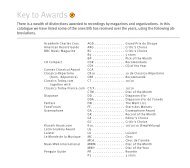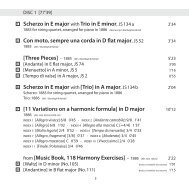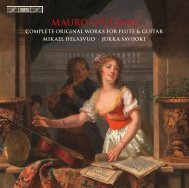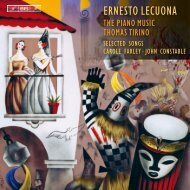MENDELSSOHN - Bis
MENDELSSOHN - Bis
MENDELSSOHN - Bis
You also want an ePaper? Increase the reach of your titles
YUMPU automatically turns print PDFs into web optimized ePapers that Google loves.
Adagio religioso, im plying a mood of devout prayer. Its heartfelt string theme is<br />
taken into new spheres by the wind instruments, although no proper sub sidiary<br />
theme arises. Instead, this more or less monothematic movement acquires mo -<br />
men tum from dotted rhythms from the strings and the display of unusual sound<br />
effects – until, at the end of the coda, a recollection of the movement’s opening<br />
bars brings the symphonic part of the Hymn of Praise to an end.<br />
The Allegro maestoso moderato, the first part of the nine-movement cantata,<br />
beg ins with a shift from D major to D minor. In the cantata two sopranos, tenor<br />
and four-part chorus join the orchestra, lending words to the victory of light over<br />
dark ness. Above dotted strings and pre-echoes from the trombones, the music<br />
swiftly rises from pia nis simo to the brilliant ‘Alles, was Odem hat, lobe den<br />
Herrn’ (‘All that has life and breath, Sing to the Lord’), which had been so close<br />
to the surface in the symphonic part of the work. Now, however, this succinct<br />
melody (which is Men delssohn’s own, al though it is closely related to a tradi -<br />
tional liturgical song formula) is heard first in homo phonic splendour, then in a<br />
joyfully excited fugato: a soprano solo, above a four-part female choir, intones<br />
the distinctive hymn of praise. If the next two sections serve primarily as a recol -<br />
lection of the time of peril and affliction, Nos 5–7 portray the dramatic turning<br />
point. In No. 5, ‘Ich harrete des Herrn’ (‘I waited for the Lord’), the two solo<br />
sopra nos, in a dialogue commented upon by the choir, declare the hope in which<br />
they believe so firmly. They do so in a way that plainly enchanted Robert Schu -<br />
mann at the première: shortly afterwards he wrote in the Neue Zeitschrift für<br />
Musik that ‘it was like a glimpse into a heaven filled with Raphaelesque ma -<br />
donnas’ eyes’.<br />
And yet darkness continues to reign, and Mendelssohn extends the anxious,<br />
im ploring cry ‘Hüter, ist die Nacht bald hin?’ (‘Watchman, will the night soon<br />
pass?’) in the highly expressive tenor recitative ‘Wir riefen in der Finsternis’ (‘We<br />
25








